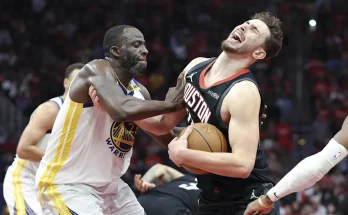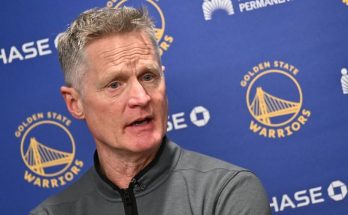The Tennessee Volunteers have always been a program defined by their quarterbacks, and once again the spotlight has turned toward Knoxville as the team makes a pivotal shift under center. With the unexpected departure of Nico Iamaleava, the highly-touted quarterback once viewed as the face of the program’s future, the Volunteers have officially named Joey Aguilar their starting quarterback. It’s a decision that is both surprising and exciting, one that reshapes the trajectory of Tennessee’s offense heading into the new season. For fans, boosters, and analysts alike, the move raises questions but also presents an opportunity to examine what Aguilar brings to the table, how the Vols got here, and what this means for the program moving forward.
Nico Iamaleava’s exit from Tennessee was one of the most shocking developments in recent memory. A former five-star recruit, he was supposed to be the centerpiece of Josh Heupel’s fast-paced, high-octane offense. Tennessee fans dreamed of the moment when Iamaleava would take full command, given his elite arm talent, mobility, and potential to elevate the Vols back into perennial SEC contention. But as is often the case in modern college football, the landscape of NIL deals, transfer portals, and personal decisions reshaped the path. Iamaleava’s sudden departure left the Vols scrambling, searching for stability at the most important position on the field. This wasn’t just about losing a player—it was about losing an identity that had been carefully cultivated over several recruiting cycles. When a quarterback leaves, particularly one expected to be the program’s leader, it can leave a void that affects every aspect of the team.
That’s why Joey Aguilar’s rise is so compelling. He’s not a household name in SEC circles, nor was he once a five-star recruit with endless media coverage, but his skillset is undeniable. Aguilar arrived at Tennessee with less hype but has consistently demonstrated the intangibles that make coaches believe he can succeed. Known for his poise in the pocket, quick release, and ability to read defenses, Aguilar presents a different flavor from what fans might have expected with Iamaleava. Where Nico dazzled with his athleticism and highlight-reel throws, Aguilar brings steadiness, decision-making, and leadership that coaches value when trying to weather a storm. His teammates have spoken highly of his work ethic in practice, his ability to rally the offense, and his quiet confidence that never seems shaken by the spotlight.
Josh Heupel’s offensive system thrives on quarterbacks who can process quickly, make the right reads, and deliver the ball on time in a tempo-driven attack. Aguilar might not have the same raw athleticism as Iamaleava, but he has shown the ability to command the offense efficiently. The Vols’ offense requires trust and timing, and Aguilar has proven in camp and scrimmages that he can deliver in those areas. Reports out of Knoxville suggest that he has developed a strong connection with the wide receiver corps, particularly with younger players who are looking for a quarterback to give them consistency. Timing routes, quick screens, and intermediate throws are going to be Aguilar’s bread and butter, and that might be exactly what Tennessee needs as they transition away from the Iamaleava era that never truly began.
This move also underscores the reality of college football in 2025: teams must adapt quickly to change. In years past, losing a star quarterback might have spelled doom for a program’s hopes, but now with the transfer portal and more experienced players ready to step in, programs can pivot faster. Aguilar, who had been waiting for his moment, now has the chance to seize it fully. This isn’t just about filling a gap; it’s about redefining what Tennessee football looks like. While many believed Tennessee’s identity would be built around Nico’s arm and charisma, it may now be built around Aguilar’s precision, grit, and steady hand.
The locker room dynamic is another element to consider. When a player of Iamaleava’s stature departs, it can fracture a team or galvanize it. The early signs suggest the latter for Tennessee. Players have rallied around Aguilar, understanding that success in the SEC doesn’t come from one star but from a cohesive unit. Offensive linemen have praised his communication skills, wide receivers have pointed out his consistency, and even defensive players have remarked that he challenges them in practice with his ability to disguise plays and deliver accurate passes under pressure. Leadership is often less about raw talent and more about presence, and Aguilar has shown the presence to keep the Vols focused.
The fanbase, of course, has mixed feelings. Losing Nico Iamaleava feels like a heartbreak, especially after years of anticipation, highlight reels, and recruiting headlines. Yet, Tennessee fans are also known for their resilience and passion, and they are beginning to warm up to the idea of Aguilar under center. The SEC doesn’t slow down for anyone, and with rivals like Alabama, Georgia, and Florida looming on the schedule, the Vols can’t afford to linger in disappointment. Instead, they must embrace the new reality and support the quarterback who will now lead them into battle. Aguilar’s story could quickly become a beloved one if he delivers on the field, particularly if he helps the Vols pull off an upset or two against heavyweight opponents.
From a developmental standpoint, Aguilar brings certain strengths that could surprise defenses. He has a strong enough arm to stretch the field vertically, even if he isn’t throwing 70-yard bombs every drive. His accuracy in the short-to-intermediate game makes him dangerous in Heupel’s system, where spacing and timing are everything. Defenses that crowd the line of scrimmage to stop Tennessee’s running game may find Aguilar quick to exploit openings with precise throws. His calm demeanor also minimizes mistakes, and in the SEC, limiting turnovers is often the difference between victory and defeat.
The ripple effects of this decision extend beyond the field. Recruiting is always tied to quarterback stability, and while losing Iamaleava could have been a major blow, Tennessee’s ability to pivot to Aguilar and present him as a capable leader could soften the impact. Recruits want to know that a program can handle adversity and still compete at a high level. If Aguilar performs well, Tennessee can show recruits that the program is bigger than any one player, and that opportunities exist for anyone who works hard and buys into the system. In fact, Aguilar’s story could resonate more with recruits who see themselves as underdogs, proving that you don’t have to be a five-star prodigy to make it in Knoxville.
Looking ahead, the expectations for Aguilar will be high, but they don’t necessarily need to mirror the lofty dreams once placed on Iamaleava. The Vols don’t need him to be a Heisman contender from day one—they need him to be consistent, dependable, and effective. If he can keep the offense moving, put points on the board, and avoid costly turnovers, Tennessee can still compete for a strong bowl game and maintain momentum in the SEC. For Aguilar, this is both a challenge and an opportunity. Few players ever get the chance to step into the starting role under such circumstances, and fewer still are able to turn that moment into a defining career achievement.
It is also worth noting that Heupel has a track record of maximizing quarterbacks who were not initially expected to be stars. His offensive system has elevated players before, and Aguilar could be the next example of how scheme and preparation can unlock potential. For Tennessee, this isn’t a step backward—it’s a shift sideways, one that could open doors fans never expected. While Nico Iamaleava’s shadow will linger for some time, the narrative is already shifting toward what Joey Aguilar can do, rather than what the Vols lost.
The broader college football world will be watching closely. In a season where so many teams are dealing with quarterback transitions, Tennessee’s story is just one thread in a larger tapestry. Yet, it feels especially poignant because of what was at stake. Losing a potential program-defining quarterback is a gut punch, but finding resilience in the face of that loss is what defines great programs. Aguilar is now the face of Tennessee’s resilience. His journey, from relative anonymity to starting quarterback in the SEC, will be one of the most intriguing storylines of the season.
As the first kickoff approaches, Tennessee fans will file into Neyland Stadium not knowing exactly what to expect. There will be nerves, there will be skepticism, but there will also be hope. Every snap Aguilar takes will carry the weight of expectation, but also the potential for something new. Football, after all, is a game of opportunity, and Joey Aguilar has just been handed the biggest opportunity of his life. How he responds will not only define his career but could also shape the trajectory of Tennessee football for years to come.
In the end, the naming of Joey Aguilar as the starting quarterback after Nico Iamaleava’s exit is more than just a roster move. It is a statement about adaptability, belief, and the unpredictable nature of college football. The Vols are turning the page, not erasing it, and Aguilar’s story is just beginning. If he succeeds, fans may one day look back on this moment not as the time Tennessee lost its future, but as the time it found a new one.


